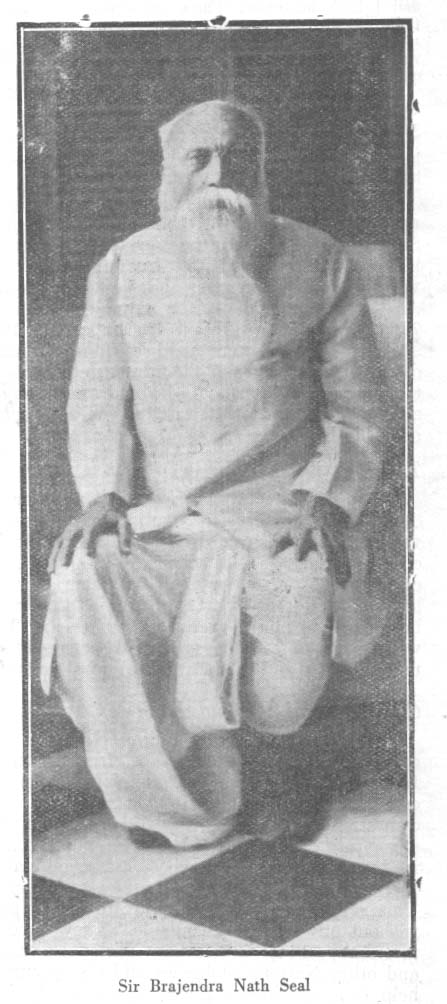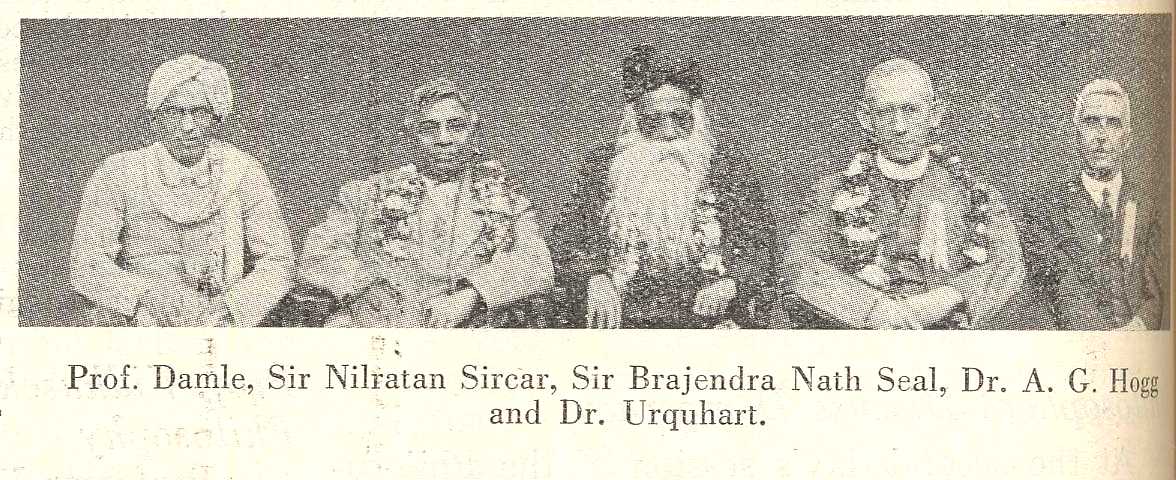Brajendra Nath Seal (1864-1938)
3 September 1864 - 3 December 1938
This page is under
construction

About this photograph
Biographical Highlights
- b. 3 Sept 1864
- student of W. Hastie at the General Assembly Institution
[later: Scottish
Churches College], Calcutta
- a fellow student of Narendra (later called Swami Vivekananda)
- BA 1883, 1st class honours
- 1884 - Professor of English Literature, City College; ["The
North City
college was founded as a school in the year 1879 A.D. and was
raised to a
college in the year 1881 by a band of patriotic and self-less
workers
of Sadharan brahmo Samaj headed by the late Ananda Mohan Bose ,
Saivnath
Sastri, Umesh Chandra Dutta & others. The City college is
one of the
eight degree colleges ,and the first among them , which are
known as City
group of colleges and are administered by the Sadharan Brahmo
Samaj , Calcutta;
102/1 Raja Ram Mohan Sarani,Calcutta-9] .
- Morris College, Nagpur; Krishnanath College, Behrampur, WB
- Seal was a friend of R. Tagore, and influenced S.K. Maitra
- 1885-1913 Principal
- 1897-1912 - Principal, Coochbehar College
- 1903 - New Essays in Criticism
- 1915 - The Positive Sciences of the Ancient Hindus (became
his
PhD thesis)
- 1913-1921 King George V Chair of Philosophy, University of
Calcutta
- Honorary doctorate (Doctor of Sc.) from the University of
Calcutta, on 17.Dec. 1921
- on 22 December 1921, Visva-Bharati was formally
inaugurated in the presence of its Chancellor Sir
Brajendranath Seal, India's leading scholar and its first
Western visiting scholar.
- The Mythic Society, Daly Memorial Hall, Bangalore [Nrupathunga
Road,
Bangalore 560001, India. (Ph: 091 80 2215034)] (Vice President
1922 - 31)
- when in 1917 Seal wanted to look into the examination system
of Calcutta University, Mahalanobis was consulted.
- unsuccessful candidate for VC, University of Dacca
- 1921-1930 Vice-Chancellor, University of Mysore
- d. 3 Dec 1938 at the age of 74
Bibliography:
- Comparative studies in Vaishnavism and Christianity. with
an examination
of the Mahabharata Legend about Narada's pilgrimage to
Svetadvipa and an
introduction on the historico-comparative method. Calcutta,
Hare Press, 1899
- New Essays in Criticism Calcutta: Som Bros., 1903
- Indian shipping: a history of the sea-borne trade and maritime
activity
of the Indians from the earliest times, by Radha Kumud Mookerji;
Brajendranath Seal / Bombay: Longmans,
Green / 1912, 283 p. / London ; New York : Longmans, Green
出版年1912 大きさxxvii, 283 p., [19] leaves
of plates : ill. ; 26 cm Includes bibliographical
references and indexes
著者標目*Mookerji, Radhakumud, 1884-1964
- The positive sciences of the ancient Hindus, London,
New York
[etc.] Longmans, Green and co., 1915; Delhi : Motilal
Banarsidass,
1985. 313 pp.
- appendices for: The positive background of Hindu sociology
/
by Benoy Kumár Sarkár ; with appendices by Brajendranáth
Seal. Allahabad : Pânini Office, 1914-<21 >; New
York,
AMS Press, 1974
- Rammohun Roy : the universal man. Calcutta : Sadharan
Brahmo
Samaj, [1924?] 42 pp.
- The quest eternal. London ; New York : H. Milford,
Oxford University
Press, 1936. 92 pp.
Letters from
1914-20: letters to EJ Thompson
Oxford
University:
Bodleian Library, Special Collections and Western Manuscripts
Reference : MS Eng c 5314
NRA 38793 Thompson
1 record noted.
Correspondence
Bibliography - Secondary Materials
- Bandyopadhyay, Sunil, 1939- Main Title: Brajendran¯atha
´S¯ila
ebam any¯anya / Sun¯ila Bandyop¯adhy¯aya. Published/Created:
Kalak¯at¯a : Rddhi-Indiy¯a, 1984. Description: 11, 262 p.,
[2] leaves of plates : ports. ; 22 cm. Summary: On the
life and works
of the Assamese Indologist Anundoram Borooah, Bengali
educationist Brajendranath
Seal, 1864-1938, and translator Roby Datta, 1883-1917; includes
letters and
bibliographies of their works. Notes: In Bengali.
Includes index.
Bibliography: p. [231]-246.
Chattopadhyay, Amal, 1942- Main Title: Ananta eshan¯a,
Brajendran¯atha
´S¯ila, j¯ibana o cint¯a / Amala Cattop¯adhy¯aya.
Portion of Title: Brajendran¯atha ´S¯ila, j¯ibana o
cint¯a Published/Created: Kalak¯at¯a : D¯ipa Prak¯a´sana,
1999. Description: 207 p. ; 22 cm. Summary: On the life,
thoughts, and works
of Brajendranth Seal, 1864-1938, Bengali intellectual and
philosopher. Notes:
Includes bibliographical references (p. 206-207).
In Bengali.
P¢ala, Pramathan¢atha,
Mah¢aman¢ish¢i Brajendran¢atha : bi´svabikhy¢ata
bidy¢ab¢aridhi Brajendran¢atha ´S¢ila mah¢a´sa¤yera
j¢ibanera kichu kath¢a / Pramathan¢atha P¢ala
Kalik¢at¢a : Rañjanakum¢ara P¢ala : Pr¢aptisth¢ana,
Prabh¢ata K¢aryy¢ala¤ya, 1984.
DESCRIPTION: 16, 116 p., [4] p. of plates : ports. ; 22 cm.
In Bengali; appendices in English.
Includes index.
Summary: On the life of Brajendranath Seal, 1864-1938,
Bengali educationist.
Photographs

He brought to our house Dr. Brajendranath Seal,
then on
a visit to London, a philosopher with a brilliant mind and a
childlike character.
They both wrote to Tagore, urging him to come to London; he would
meet,
they said, at our house and elsewhere, men after his heart."
in Rabindranath
Tagore : Sadhaka of Universal Man, Baul of Infinite Songs by Monish
R. Chatterjee
------------------------------------
In his inaugural address read at the Sri Ramkrishna Centenary
Parliament
of Religion and published in the Modern Review in April 1937, Dr
Brajendranath
Seal said:
"Rammohun Roy, the precursor and in a very real sense the father of
Modern
India, sought the Universal Religion, the common basis of the Hindu,
Moslem,
Christian and other faiths. He found that each of the national
religions
was based on this common faith with a certain distinctive historical
and
cultural embodiment.
"It is fundamental to note that Rammohun Roy played two roles in his
own
person:
1. As an universalist he formulated the creed of what
was called
Neo-theophilanthropy (a new love of God and man) on positive and
constructive
lines. He construed the Gayatri on this basis. And, strange to say,
this
Hindu became one of the forefathers of the Unitarian creed and
worship in
the West, the other three being Prince, Priestly and Canning.
2. As a Nationalist Reformer, Rammuhun Roy had a
three-fold
mission:
* As a Hindu Reformer, he gave a Unitarian
redaction of
the Hindu Shastras from the Vedanta and the Mahanirvana Tantra
* As a Moslem defender of he faith, he wrote the
Tuhfat-Ul-Muwahhiddin
and the Monozeautul Adiyan, which were polemical works, and
* As a Christian, he gave a Unitarian version of
the entire
body of scriptures, old and new, in his controversies with the
Christian
Missionaries.
Rammohun Roy was thus in himself, a Universalist and three
nationalists all
in one."
This web page will
be updated periodically. Questions and suggestions should be
sent to Will Sweet at wsweet@stfx.ca
Copyright © William Sweet 2003


